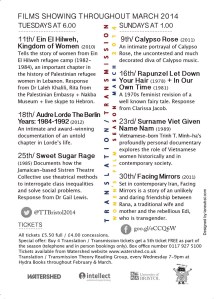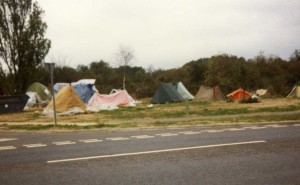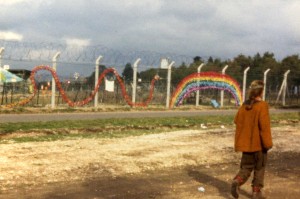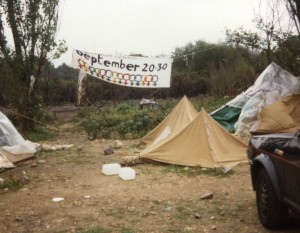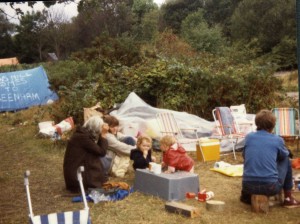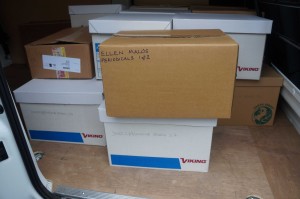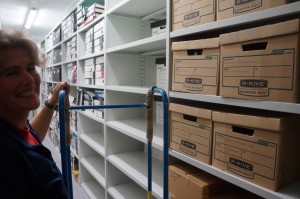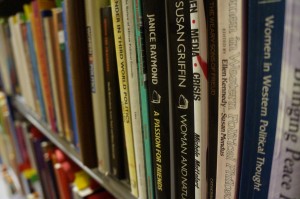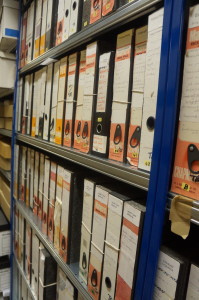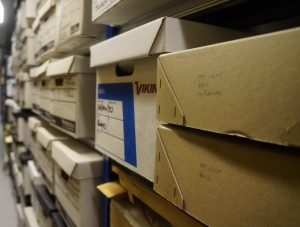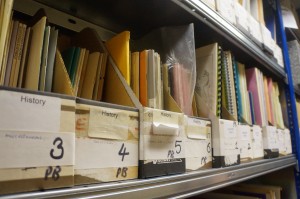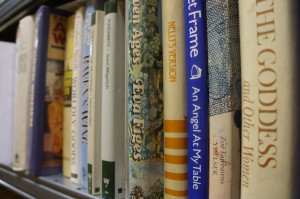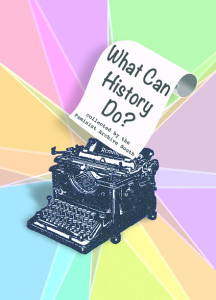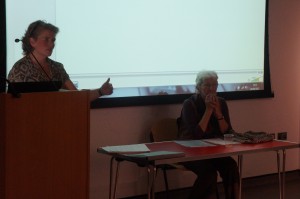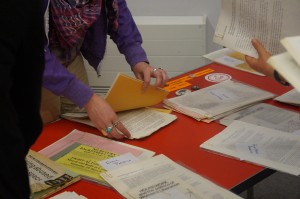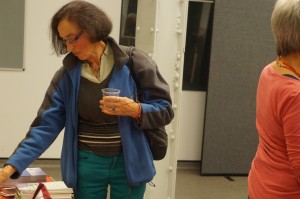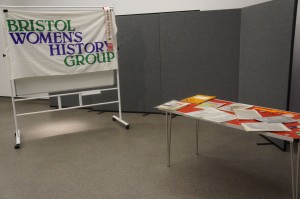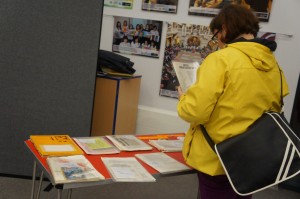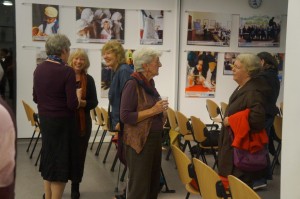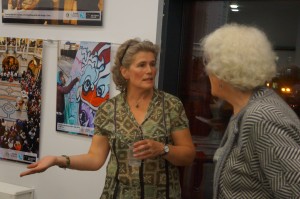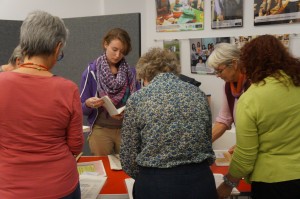The post Cfp – Situating Women’s Liberation; Historicizing a Movement Symposium appeared first on Feminist Archive South.
]]>The University of Portsmouth: Friday 4 July 2014
The women’s liberation movement (WLM) erupted into late 1960s Western society as a powerful force for social change, challenging rigidly defined and oppressive sex role stereotypes, promoting a set of formal demands for women’s equality and introducing terms such as ‘sexism’ and ‘male chauvinist’ into everyday language. There is little doubt that the women’s liberation movement had a profound impact, yet popular images of the original ‘women’s libbers’ portray second wave feminists as men hating, bra burning, dungaree clad harridans. There is currently renewed interest in feminism, and an upsurge of feminist activity. This has been accompanied by a desire amongst feminist historians to develop the historiography of the WLM. The aim of this one day conference is to historicize the women’s liberation movement within western society between c1968-1990.
Papers are invited in any area of women’s liberation c1968-90 in Britain, Continental Europe and North America. We are particularly interested in the following themes:
- ‘The personal is political’: consciousness raising, personal narratives, oral testimony – remembering the WLM;
- Sexuality and contraception, including lesbian, bisexual and transgender feminists, sexual violence and ‘reclaim the night’;
- Struggles at work: women’s strikes, equal pay, against sex role stereo typing – equal opportunities;
- The WLM and media: campaigns against sexist advertising;
- feminist publications;
- Black feminism;
- Women from ethnic minorities/ women of colour in the WLM;
- Cultural dimensions of the WLM: feminist art, theatre, writing;
- Transnational dimensions
This conference is aimed primarily at historians but will also be of interest to scholars in other disciplines, notably Literature, Cultural Studies, Sociology and Media Studies.
Please send abstracts up to 300 words to Sue Bruley ([email protected]) by 4th April 2014.
Website and Booking: http://www.port.ac.uk/centre-for-european-and-international-studies-research/events/situating-womens-liberation/
Local Information: http://www.visitportsmouth.co.uk/
The post Cfp – Situating Women’s Liberation; Historicizing a Movement Symposium appeared first on Feminist Archive South.
]]>The post Translation/ Transmission: Women’s Activism Across Space and Time Film Season, March 2014 appeared first on Feminist Archive South.
]]>Translation/ Transmission brings together well-received and less well-known films that will be shown together for the first time in a season that explores the potential of film and feminist media to translate across the boundaries of language, genre, time and culture.
Translation/ Transmission features activist documentaries and women filmmakers from the Women’s Liberation Movement in Britain, Jamaica, Palestine, Germany, Vietnam, USA, Iran and France/ Cameroon, highlighting the diversity of different feminisms across geographical locations and historical moments.
Screenings will be enriched by discussion from activists, academics and artists; audiences will be invited to participate in discussions about the role played by feminist artists and filmmakers in rendering visible forgotten histories and marginalised experiences.
We are excited to be sponsoring the screening of Rapunzel, Let Down Your Hair and In Our Own Time which is taking place on Sunday 16 March at 1pm.
Check out the full programme.
The post Translation/ Transmission: Women’s Activism Across Space and Time Film Season, March 2014 appeared first on Feminist Archive South.
]]>The post Calling all Spare Rib contributors – from the British Library appeared first on Feminist Archive South.
]]>Few titles sum up an era and a movement like Spare Rib. The magazine ran from 1972-1993 and for many women was the debating chamber of feminism in the UK.
The British Library has recently embarked on a pilot project to assess the feasibility of digitising the complete run of Spare Rib magazine. Although the entire run of the magazine has always been available to readers at the British Library and other libraries, digitising the copies and making them freely available online would transform access for researchers and the wider public.
As Spare Rib is still in copyright, in order for this project to go ahead it is crucial for the British Library that all Spare Rib contributors (including illustrators and photographers) grant permission for their material to be digitised and made available online for non-commercial use. The contributors and Spare Rib collective members we have spoken to date have been very positive but we still need to contact a great number of former contributors to ask their permission to digitise their content.
The British Library is undertaking a feasibility study between now and the end of December 2013 to see whether this will be possible. Without sufficient permissions to digitise the project will not go ahead.
If you were a contributor to Spare Rib then we want to hear from you! Please get in touch for more information by contacting [email protected]. If you could specify the approximate date you were a contributor and the name by which you were known that would be very helpful.
The post Calling all Spare Rib contributors – from the British Library appeared first on Feminist Archive South.
]]>The post New Additions to the Greenham Common Collection – The story of Mrs. Jocelyn Wood appeared first on Feminist Archive South.
]]>We were recently contacted by Michael Wood, the son of Mrs. Jocelyn Wood, who sadly recently passed away, to see if we would be interested in housing a piece of the Greenham Common fence and some photographs of the camp. Of course we said yes!
An email from Michael is included below to introduce his mother’s text, which outlines her memories of being stationed at Greenham Common during the Second World War, years before she returned to Greenham as an activist.
A big thankyou to Michael for letting us post this story on the website, along with the photos. If you want to view the items in the flesh, they bear the catalogue number DM2123/1/Archive Boxes 129.
‘Hello
My wife has recently contacted you about a piece of fence from Greenham Common from my mother (Jocelyne Wood, nee Withycombe) – correspondence below. We think she has some photos as well which we will try to dig out and send them together.
She did write a few notes about her life – nothing about going to Greenham during the seventies (?) but she was stationed there for a few months during the war until the Americans arrived – see attachment.
We’ll be in touch again when we’ve found the photos.
Best wishes
Michael (Wood)’
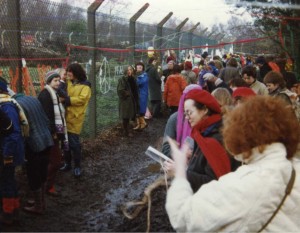 RAF Greenham Common was like a holiday camp after Hednesford, I spent three very enjoyable summer months there July to August 1943, WAAFs were billeted in a large house with a garden stretching down to the Kennet, a fast flowing chalk stream, It was ideal bathing, We were working outside doing daily inspections on Oxfords, which in good summer weather was pleasant work.
RAF Greenham Common was like a holiday camp after Hednesford, I spent three very enjoyable summer months there July to August 1943, WAAFs were billeted in a large house with a garden stretching down to the Kennet, a fast flowing chalk stream, It was ideal bathing, We were working outside doing daily inspections on Oxfords, which in good summer weather was pleasant work.
We did the same jobs as the RAF – for which as far as I can remember we got half the pay, NCOs were all RAF and most had served RAF apprenticeships.
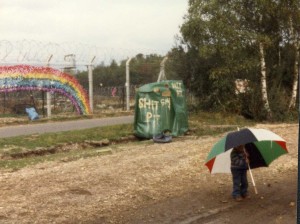 Greenham was a Training Command station. WAAF mechanics were never sent to active service stations – a fact you were not told when you joined up. Our Greenham was very different from the USAF cruise missile base, The main Basingstoke road, now diverted, ran through the camp. As far as I can remember there were no fences even round the runway. It trained for night flying so there must have been some way of stopping traffic when flying was in progress.
Greenham was a Training Command station. WAAF mechanics were never sent to active service stations – a fact you were not told when you joined up. Our Greenham was very different from the USAF cruise missile base, The main Basingstoke road, now diverted, ran through the camp. As far as I can remember there were no fences even round the runway. It trained for night flying so there must have been some way of stopping traffic when flying was in progress.
Hitching to Fleet from Greenham was easy usually only taking about an hour, so I went home a lot – sometimes just for a half day.
The road to Basingstoke was beautiful with wild clematis and scabious. I had my cycle with me as did most of the others. A favourite evening ride was to Kingsclere where there was a good YM canteen in a magnificent barn. (I have since tried without success to identify that barn.)
The Services’ canteens and hostels were very useful, There were hostels in most major towns which I made much use of on my hitching expeditions. London ones were particularly useful making theatre visits possible, A uniform opened many doors. Looking back it seems very unfair. Girls conscripted to factories like ROF Chorley worked much harder and for longer hours than we did, were away from home living inferior hostels with inferior food but had no such facilities, nor did the Land Army.
For other entertainment there was Newbury and the Americans, There were several US bases nearby that invited us to dances, The main attraction was the food rather than the G.I.s most of whom were boring. There were WO exceptions, I got to know David McGeon because I happened to tell him I was reading War & Peace. I went out with him several times. He was a film script writer and was fairly left wing. He was interesting, but too introspective to be easy company, Then Stan Sobolewski took over. I met him at a dance at the Corn Exchange in Newbury from where we walked through the park by the river orchestrated by thunder and lightning – but no rain.
I saw a lot him during the next two weeks. He was tall, dark and handsome and very attractive, but not political. He was of Polish origin and came from Detroit, Two weeks later the blow fell: the Americans were taking Greenham over and the RAF had to move. Stan and I corresponded for several months and met once in London, but the magic had gone. I had had a lucky escape.
The news of the move was devastating to everyone. We all liked Greenham. We had one week’s notice. A special train was provided for the move. The whole station packed up and moved. Our destination was Long Newnton, Glos. It was an unattractive camp and the nearest town, Tetbury, was no compensation for Newbury in spite of its lovely old buildings. I was there less than a week before I was posted yet again – to the Fitters’ Course at Halton.
The post New Additions to the Greenham Common Collection – The story of Mrs. Jocelyn Wood appeared first on Feminist Archive South.
]]>The post Archiving in a born digital era appeared first on Feminist Archive South.
]]>The post Archiving in a born digital era appeared first on Feminist Archive South.
]]>The post Sheba Press & worries about link rot appeared first on Feminist Archive South.
]]>So when conducting research about Sheba Feminist Press, who published the important Black British feminist text Charting the Journey in 1988 and many others, it was a relief to find some information about them.
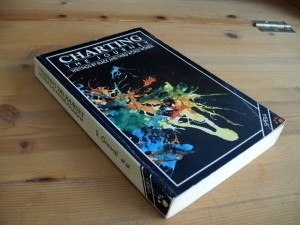
What was slightly disconcerting was the nature of the web page, which appeared graphically old and was hosted by a US university site. It wasn’t being actively maintained and was the kind of link, you suspect, that would soon disappear.
In short, this is the rationale for reproducing the text below in its entirety from that web page in case it breaks, or vanishes.
For further information, the Women’s Library in London was donated records from Sheba Press (1980-1994) in 1995, but it remains uncatalogued and unaccessible to researchers.
Now there’s a funding bid that needs to happen!
ABOUT SHEBA FEMINIST PRESS
Sheba Feminist Press was established in 1980 — one of a handful of small independent publishers born of the UK women’s movement during the 70s and early 80s. The new feminist presses turned their backs on the high-modernist clique then firmly in control of the British book scene, and looked instead at what that world literally couldn’t see: the writing of women who hadn’t been to Oxford or Cambridge, and who weren’t necessarily white or heterosexual or middle-class, and who didn’t speak with the polished vowels of Bloomsbury. The new writers weren’t seduced by the pastoral English idyll of haywains and cottages and
servile, cap-doffing peasantry. They wrote instead about what it was like to live as an ordinary, non-privileged woman in post-imperial Britain in the second half of the twentieth century. The ordinary, non-privileged women who constituted a large part of the book-buying public found their own lives reflected in
these books, and responded with what can only be called devotion. The phenomenal success of women’s publishing was probably the single biggest factor in the dissemination of feminist ideas to
women in the UK.
Today, mainstream UK publishing has been persuaded of the marketability of women writers. Many large publishers have their “women’s studies” lists, and women novelists (some of them) get
reviewed on the literary pages, just like men. But old predilections die hard — particularly, in Britain, the predilections associated with intellectual and social snobbery: if more women writers are published now than in 1965, it remains true that the majority are white, heterosexual, and middle-class.
Sheba has a mission to challenge this persistent bias. We give priority to the work of women writers who continue to be marginalized. That means more than simply being ready to publish writing by women of colour, or lesbians, or working-class women; it means recognising the multiplicity of voices within these
communities — a multiplicity which is frequently overlooked by a world quick to categorize and dismiss. Sheba has built its reputation around its commitment to diversity, to difference, and to open and critical debate. One of our earliest titles was Feminist Fables — a retelling of myths, from a lesbian-feminist
viewpoint, by an Indian woman, Suniti Namjoshi. Published in 1981, when lesbian-feminists were universally assumed to be white, and Indian women universally assumed to be heterosexual, Feminist Fables called into question this cosy compartmentalization; it can be seen in retrospect as a harbinger of the coming
struggles over difference and diversity, which by the end of the decade had put paid to the myth of a unitary feminist identity.
This commitment to openness and to diversity has made Sheba a key player in the ongoing feminist debates around sexuality. In the Seventies and the early Eighties, many women had a new and pleasurable sense of ownership over their bodies and their sexuality; and this was reflected in the books being published.
For Ourselves (Anja Meulenbelt, 1981) was characteristic: written by a woman, for women to read, it rejected the marriage-guidance approach which had previously dominated the field (“Doctor, my
wife is frigid. Can you help me?”) and acknowledged women’s sexuality as a private source of pleasure and power available to all women. Joanni Blank’s The Playbook for Kids About Sex (first published in the US by Down There Press) adopted a similarly positive attitude; children were encouraged to explore their bodies and to experiment with masturbation, fantasy, and sexual play. These and other Sheba titles contributed to the growing acceptance of women as autonomous sexual agents, rather than eternal objects, and helped to undermine the cultural prescription of what Adrienne Rich described as “compulsory heterosexuality”.
As the old prescriptions crumbled, however, new ones sprang up to replace them. The ideological association of sexuality with patriarchal power, expressed through pornography and rape, made sex seem synonymous with oppression. For women, desire was taboo all over again. In 1988, Sheba challenged this new puritanism by bringing out the UK edition of Joan Nestle’s A Restricted Country (first published in the US by Firebrand). The publication of this collection of essays and stories about lesbian sexuality acted as a catalyst on the simmering dissensions over lesbian sado-masochism, butch-femme relationships, and perverse sexuality, and gave the UK proponents of sexual autonomy an important cultural reference point.
The following year, Sheba built on the success of A Restricted Country, by bringing out Serious Pleasure, a collection of lesbian erotica . Although the controversy over pornography and censorship continues, it is clear from the popularity of Serious Pleasure and its successor, More Serious Pleasure that there is a strong and growing demand from many UK lesbians for well-written, explicit, woman-centred erotic material. (N.B. Serious Pleasure and More Serious Pleasure are published in the US by Cleis Press.)
Today, Sheba continues to prioritize the work of women of colour and lesbians. A number of prominent Black U.S. writers have been published in the UK by Sheba, among them bell hooks, Audre Lorde, and Jewelle Gomez. Sheba is now turning its attention to the exciting possibilities opened up by new technology, particularly multimedia and computer-mediated communications. We welcome the
new ease with which we can communicate with other women in countries all over the world; Sheba’s dedication to openness, fluidity, and the absence of boundaries finds a natural home on
the Internet.
Whatever the medium, the message remains the same: feminism, diversity, debate. If you would like to know more about Sheba, please write to us at [email protected]. We’d like to hear from you, and we promise to answer all messages. Sheba titles are available in the U.S. from Inland Book Co., and in Australia from Bulldog Books.
Sheba Feminist Press is a not-for-profit workers’ co-operative.
The post Sheba Press & worries about link rot appeared first on Feminist Archive South.
]]>The post Sistershow materials catalogued and searchable appeared first on Feminist Archive South.
]]>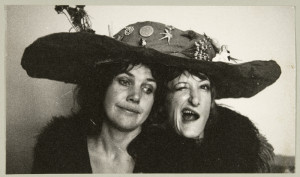
Pat VT West & Jackie Thrupp sit together under a giant hat that was made by Jackie for the first Sistershow performance in March 1973
In the meantime, enjoy these photos that we digitised as part of the project:
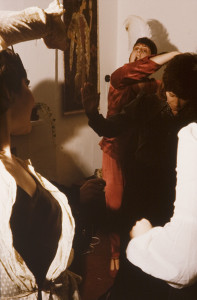
The figure dressed in red satin is Alison Rook, who donated a large archive for the exhibition, and was instrumental in getting the project off the ground.
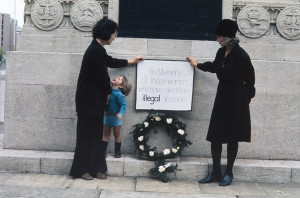
Part of Helen Taylor and Brenda Jacques tape slide project that was used to raise awareness between women/ feminist groups about the activities and ideas behind women’s liberation
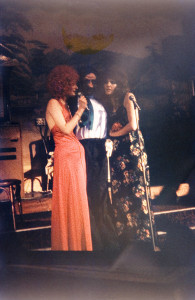
One of the few photographic documents of the Sistershow performances. This is the first show, that took place at Bower Ashton. Note the degradation of the image.
We still have catalogues from the exhibition available and you can get one for a small donation.
The post Sistershow materials catalogued and searchable appeared first on Feminist Archive South.
]]>The post Ellen’s Papers available on the Special Collections Catalogue appeared first on Feminist Archive South.
]]>Ellen Malos’ archives are now searchable on the Special Collections catalogue at the University of Bristol.
They carry the classificatory mark of ‘Ellen Malos Papers, DM2123/8/112-128′ should you wish to find them.
Thanks to Sarah Cuthill, the project archivist, for her fantastic work getting all the papers organised to such a high standard!
The post Ellen’s Papers available on the Special Collections Catalogue appeared first on Feminist Archive South.
]]>The post Final Stop for Ellen’s Archives appeared first on Feminist Archive South.
]]>Sarah stands in front of her handy work
Don’t forget, Ellen’s archives are available to consult so do get in touch if you want to see them. As always, you will need to plan your trip in advance to ensure the items you want can be retrieved from store.
The post Final Stop for Ellen’s Archives appeared first on Feminist Archive South.
]]>The post Final event for Ellen Malos’ Archives – documentation appeared first on Feminist Archive South.
]]>We welcomed Cherry Ann Knott from the Heritage Lottery Fund, project archivist Sarah Cuthill presented the contents of Ellen’s archive, and Ellen provided a response.
The evening also launched our booklet What Can History Do? which is available for a donation through this website.
After the formal presentations, attendees had the opportunity to browse material from Ellen’s archive, as well as have good chat.
Thanks to everyone who came and participated in the wider project. We are working on some new ideas for funding bids, but will of course keep this blog updated with regular information about relevant events in Bristol and beyond.
Ellen’s archive is catalogued and available to view in the Feminist Archive South, so don’t forget you can pay us a visit if you are curious about its contents.
In the meantime, enjoy the photos!
The post Final event for Ellen Malos’ Archives – documentation appeared first on Feminist Archive South.
]]>
